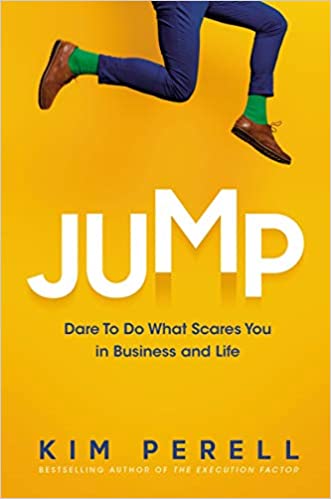We all doubt ourselves sometimes. Doubt can feel like a self-made prison that keeps you locked inside your own insecurities. It’s usually the negative soundtrack of your inner voices telling you to not take action. But more often than not, it’s a mirage of negativity—you just have to be able to see through it! And trust me, I know how hard that is; I’ve also dealt with the cynical effects of trusting my doubt more than my true ability. Early on in my career, I passed up many opportunities I was actually perfect for because the voices of self-doubt in my head convinced me I wasn’t qualified! These are the types of thoughts that held me back:
• You’re definitely going to fail.
• You don’t have enough experience.
• People are going to notice that you don’t meet the qualifications.
I felt all of these doubts when I was asked to join my first corporate board. At first, I was ecstatic! It was an honor, and it felt like such a milestone in my career, I had to say yes . . . right? But then the voice of doubt started to creep in:
- I’ve never been on a board before.
- All the other board members have fancy degrees and MBAs.
- What if they find out I’m not qualified?
The other board members were all men, were twenty years older than me, and had spent their entire careers as investors. I was an operator with no investment experience at the time. I was nothing like the other people on the board, so how could I possibly be a good fit? My feelings of self-doubt and unworthiness spiraled, and I ended up making an excuse about why I couldn’t join the board.
Five years later, I was at a dinner with one of the board members, and he asked me why I’d declined the offer. I told him I didn’t believe I had enough experience as an investor. He said, “We wanted you to join because of your digital expertise and your operating experience running a company.” He told me that they were pursuing me to join because they wanted a well-rounded board with a diversity of experience. I was shocked and disappointed that I had just assumed I wasn’t qualified, when in reality the experience I had made me the ideal board member. My self-doubt stopped me from taking on an amazing career opportunity. So from that moment on, I made a commitment to myself to push past my insecurities and trust myself and my abilities. From that moment on, I was determined not to let that happen again. I decided that whenever a new and exciting project or opportunity showed up in my life, instead of saying no when my insecurities, doubts, or fears reared their ugly heads, I would say yes, even if I didn’t feel fully qualified or ready.
I said yes to: new projects, new partnerships, new clients, new countries, new boards. I pushed myself to give terrifying presentations, I cold-called investors asking for money, and I embraced negotiating business deals with people I thought would say no. I turned saying yes and moving beyond my self-doubt into a practice.
It’s totally human and normal to doubt ourselves. Women especially fall prey to this tendency. Did you know that most men will apply for a job when they meet only 60 percent of the qualifications, but many women will apply only if they meet 100 percent of them? Even though studies have consistently shown that companies employing women in large numbers perform better, women individually struggle with self-doubt— so much so that social scientists have named the phenomenon: the confidence gap. Women also tend to struggle with impostor syndrome more than men. Even famous and wildly successful women have reported that they worry constantly they don’t deserve the praise they receive.
Self-doubt is poison. It plagues many of us and holds us back from chasing our dreams. Luckily, it can be managed— and even defeated—with the right tools and mindset.
Here are three strategies I use for dealing with self-doubt:
1. Make a List of Your Top Accomplishments: Think of this like a highlight reel of your successes in life. It will serve as a reminder of past wins and give you confidence that you will succeed again if you put in the hard work.
2. Reframe Inexperience: When you are doing something new, remind yourself that you are a beginner, not an imposter. It takes time to become an expert, and every expert started as a beginner.
3. Give Yourself Advice: Ask yourself what you would say to a friend with the same destructive thought patterns. I’m sure you wouldn’t be as negative or defeatist with them as you are with yourself. Help yourself realize how far-fetched and unfounded your doubts are.
Making changes in your personal or professional life is hard enough without your inner voice telling you that you are unqualified or unprepared. Having strategies to overcome self-doubt will make it easier to take your jump. When you learn to conquer those feelings of inadequacy and focus on the positive, you are training your subconscious to be your ally and not your enemy. You will be equipped and ready to choose hope, confidence, and optimism even when the road ahead looks impossible.



